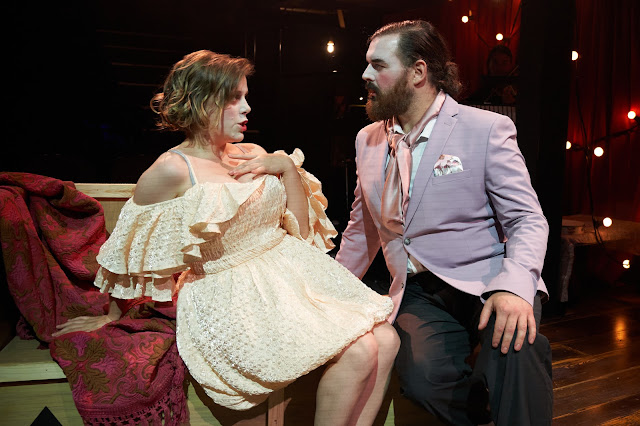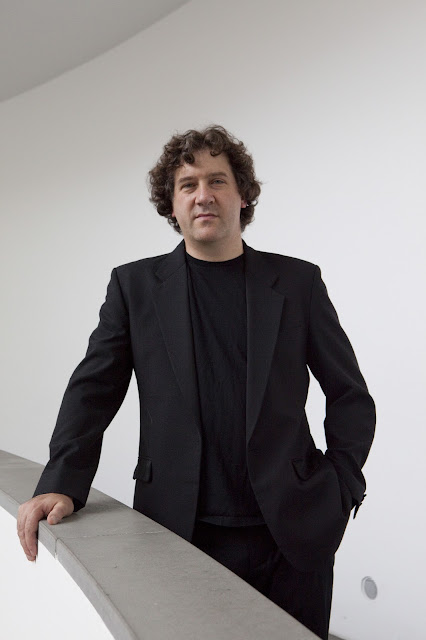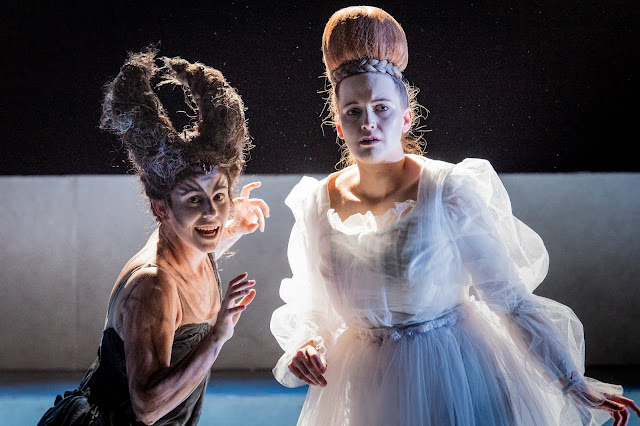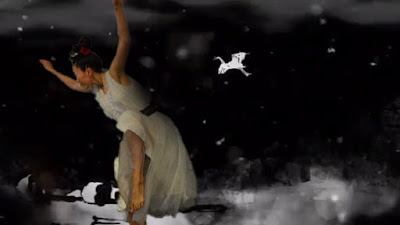 |
| Mozart: Don Giovanni - Ensemble OrQuesta at Grimeborn Festival, Arcola Theatre (Photo: Julian Guidera) |
Mozart: Don Giovanni; Marcio da Silva, Flavio Lauria, Helen May, Rosemary Carlton-Willis, Anna-Luise Wagner, John Twitchen, director: Marcio da Silva, Hastings Philharmonic Orchestra Ensemble, conductor: Andreas Levisianos, Ensemble OrQuesta; Grimeborn Festival at the Arcola Theatre
Reviewed 29 August 2025
A compact chamber version of the opera, notable for its pacey drama and vividly vigorous individual performances
One week, two festivals, two Mozart operas in two very different venues. Following on from Glyndebourne's performance of Mozart's Le nozze di Figaro at the Royal Albert Hall for the BBC Proms [see my review], we caught Mozart's Don Giovanni performed by Ensemble OrQuesta at the Arcola Theatre as part of the Grimeborn Festival where Ensemble OrQuesta has performed annually for the last six years.
On Friday 29 August 2025 we caught Mozart's Don Giovanni in the Arcola Theatre's large studio. The company originally performed Don Giovanni in 2017 and Marcio da Silva's production was revived and revised earlier this year at the the Cockpit. Ensemble OrQuesta's artistic director and founder Marcio da Silva both directed the show and performed the title role, with Flavio Lauria as Leporello, Helen May as Donna Elvira, Rosemary Carlton-Willis as Donna Anna, Anna-Luise Wagner as Zerlina, John Twitchen as Don Ottavio, Jay Rockwell as Masetto and Vedat Dalgiran as the Commendatore. Andreas Levisianos conducted an instrumental ensemble of eight drawn from the Hastings Philharmonic Orchestra (of which Marcio da Silva is founder and artistic director). Costumes were by Gil Jenks and puppets by Orlando Bishop.
Ensemble OrQuesta functions very much as a repertory company and all of the cast had performed a number of other roles with the company including last year's Le nozze di Figaro [see my review] and Handel's Alcina in 2022 [see my review]. The company's founder and artistic director Marcio da Silva is something of a Renaissance man, encompassing directing shows, conducting as well as singing. For this run of performances, having directed the show da Silva was alternating singing and conducting this meant that this evening's conductor, Andreas Levisianos, though he had worked with the company before, was only conducting this one performance which was not ideal.
The instrumental ensemble (string quartet, double bass, flute, clarinet and bassoon) took a little time to settle down. Andreas Levisianos's speeds in the overture were brisk and there were moments when we missed the sheer weight of a full orchestra, even though the players were admirably incisive. Levisianos also accompanied the recitatives on piano.
The version of the opera used was trimmed so that it lasted 160 minutes (including interval). We had the basic Prague version so no 'Mi tradi' for Donna Elvira, but more than that Don Ottavio got neither of his arias and Zerlina's 'Batti, batti' was omitted too. The ending did not hang around either and we ended with the Don's descent to Hell (cue red glow). The aim was to create a compact version of the drama which matched the intensity and pace of the performance.
 |
| Mozart: Don Giovanni - Ensemble OrQuesta at Grimeborn Festival, Arcola Theatre (Photo: Julian Guidera) |














%20Alex%20Brenner,%20no%20use%20without%20credit,%20Arcola%20-%20Gotterdammerung%20@%20Hackney%20Empire%20(_1DC1451_dx).jpg)


%20Alex%20Brenner,%20no%20use%20without%20credit,%20Arcola%20-%20Die%20Walkure%20@%20Hackney%20Empire%20(_1DC0091_dx).jpg)

%20Alex%20Brenner,%20no%20use%20without%20credit,%20Arcola%20-%20Die%20Walkure%20@%20Hackney%20Empire%20(_1DC0091_dx).jpg)









.jpg)

.jpeg)





.jpeg)